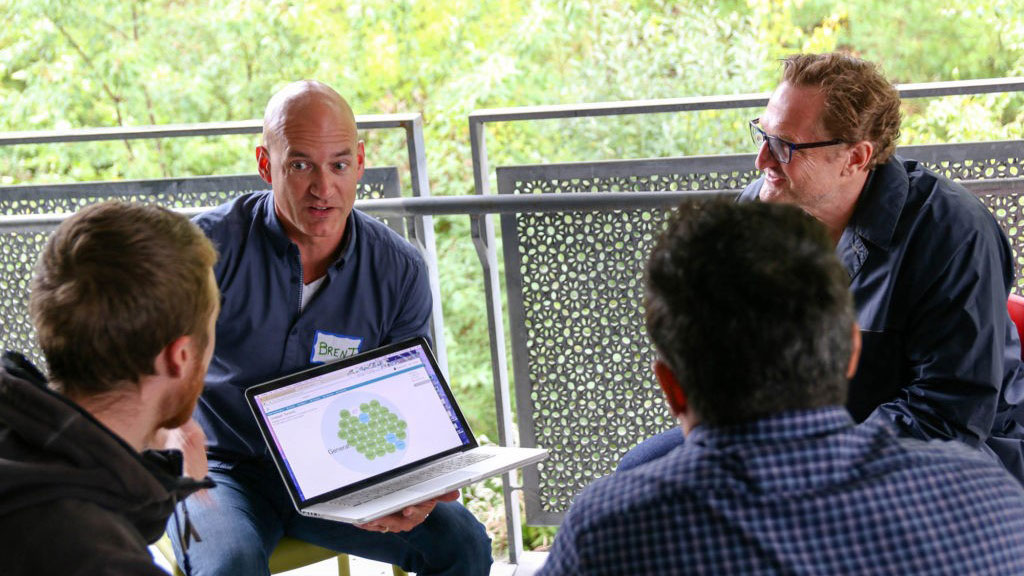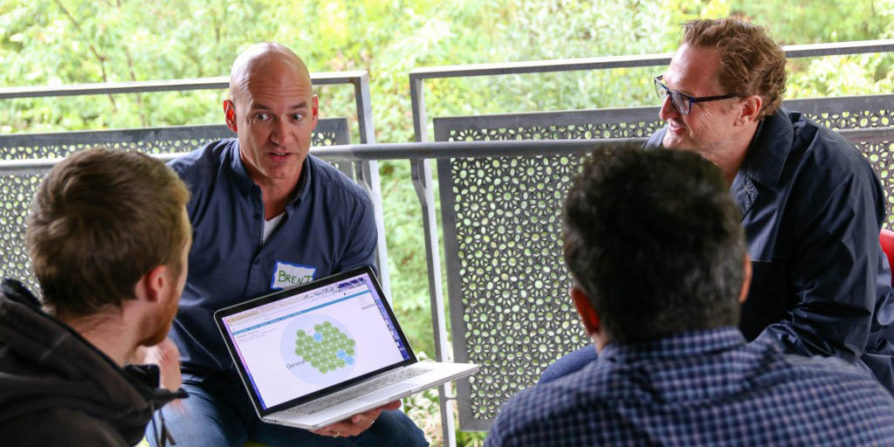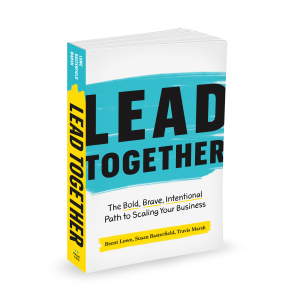
Brent Lowe: how to scale your business effectively and ethically
Brent Lowe founded his first business at the age of 17, and he’s either been an entrepreneur himself or working to support other founders ever since. He’s been in the room while companies have experienced runaway success—and while they’ve been saved hours before going bankrupt.
In the early days of entrepreneurship, Brent didn’t have anyone supporting and guiding him. As he learned more and developed his skills, he committed to being that person for others. Now, as a scale coach for founder CEOs, he’s expanding his impact with a new book, Lead Together, co-authored with Susan Basterfield and Travis Marsh. We caught up with Brent to see how companies can scale effectively and ethically.
Bullfrog: Your book, Lead Together, is about building businesses differently. How do you think traditional company structures are failing to nurture modern ways of working?
Brent: The organization charts for traditional businesses usually look like pyramids representing both reporting and power structures. Long ago, this approach to business made sense in many contexts. Information gravitated to the top where smart, trained people made decisions that were then sent down the pyramid for workers to execute mechanical tasks.
But now, work is much less mechanical and requires more creativity. The traditional structures keep power, control, and decision-making centralized, which leads to the zapping of energy, motivation and joy for all involved. It’s difficult for any business to thrive when everyone on the team is somewhat disengaged.
Bullfrog: What advantages do self-organizing and self-management provide?
Brent: Self-organizing businesses prioritize a philosophy of leading together. That is, they organize around a clear and evolving purpose and associated accountabilities, co-create systems where everyone on the team can make decisions, and invest heavily in creating transparent environments with healthy feedback loops.
Rather than having power consolidated with a small number of individuals, everyone on the team has the power to speak, be heard, and help shape the future of the organization. These organizations move faster and bring everyone on the team along.
“Rather than having power consolidated with a small number of individuals, everyone on the team has the power to speak, be heard, and help shape the future of the organization.”
Brent Lowe
The pandemic has highlighted the benefits accompanying this approach. My clients who had already embraced self-organizing ways of working didn’t miss a beat. They shifted to remote work and continued to thrive. One of my self-managing clients is having its best year ever—as measured by revenue and team engagement—because the team was fully committed and capable of weathering the storm together. Team members voluntarily reduced their pay, reshaped their offerings, and supported their current customers with little difficulty.
Bullfrog: Your company, BASE Associates, is a Certified B Corp and member of 1% for the Planet. It’s also bullfrogpowered! How do you envision the role of environment, social, and governance (ESG) criteria in business?
Brent: For decades now, the focus of business has been on optimizing for efficiency, reliability, and reproducibility. Now our current systems are failing us. We’re taking more from our planet than the Earth can regenerate. Individuals are revolting against oppression and a lack of opportunity. The ways we’re working are serving neither businesses nor employees.
Recent reports from the Intergovernmental Panel on Climate Change tells us that, in order to avoid climate catastrophe, our civilization must undergo a radical transformation within a decade. I’m optimistic. I see a path back from the brink through redesigning how we live and work together. Facilitating this change requires each of us to take a hard look at how we choose to do business. At BASE, with the help of Bullfrog, we’re well on our way to being carbon negative. We take the topics of diversity and inclusion very seriously and aim to be fully transparent in our governance.
I was originally introduced to the B Corp certification through Bullfrog’s status as one of Canada’s earliest B Corps. I’ve long wanted to join the community. Our team invested the last year in documenting our current practices and adopting some new ones to meet the high bar required for certification. Becoming a B Corp and embracing new ways of working are choices our team has made by listening to what seems to be needed now and then acting upon that need.
Bullfrog: What’s one thing a manager can do today to start promoting the system of shared accountability and responsibility you describe in Lead Together?
Brent: When it comes to changing paradigms, language becomes critical. For example, in self-organizing and self-managing companies, we don’t speak of employees and employers. In a traditional hierarchy, words like manager, executive, and employee have long histories anchored to an old paradigm.
We encourage managers to start referring to those they work with as colleagues and peers. With that simple language shift, they may then find themselves re-evaluating how they interact with the individuals around them. There are so many more practical, real-world examples in Lead Together to help guide readers into healthy experimentation.
Can’t get enough of sustainable scaling? Read how Righteous Gelato prioritized the environment while they increased production by 1,500% in five years!

